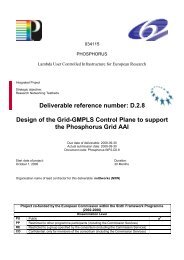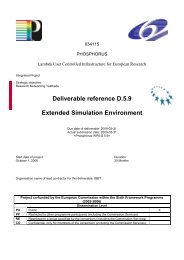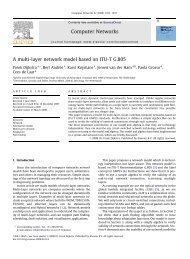Grid Job Routing Algorithms - Phosphorus
Grid Job Routing Algorithms - Phosphorus
Grid Job Routing Algorithms - Phosphorus
You also want an ePaper? Increase the reach of your titles
YUMPU automatically turns print PDFs into web optimized ePapers that Google loves.
<strong>Grid</strong> <strong>Job</strong> <strong>Routing</strong> <strong>Algorithms</strong>to the CPU over a particular time period. In space shared approach (one user-level application has exclusiveaccess to one or more CPUs), the application can specify the number of CPUs as a QoS parameter. In spaceshared approach only one application is allowed to use the CPU for 100% of the time, over a particular timeperiod.Storage QoS requirements are related to access devices such as primary and secondary disks or other devicessuch as tapes. In this context, QoS is characterised by bandwidth and storage capacity. Bandwidth is the rateof data transfer between the storage devices and the application program for reading or writing data. Bandwidthdependents on the speed of the bus connecting the application to the storage resource, and the number ofsuch buses that can be used concurrently. Capacity, on the other hand, is the amount of storage space that theapplication can use for writing data.In a usual <strong>Grid</strong> scenario the user requests a minimum end-to-end delay. This is one of the most important userrequirements, and it is quite difficult for the <strong>Grid</strong> network to satisfy it. The end-to-end delay is defined as thetime between the task’s creation at the user and the time the corresponding output returns to him, after the taskis executed in the <strong>Grid</strong>. The end-to-end delay includes the delay induced by the network for transferring theneeded data, by the computational resources for executing the needed tasks and by the storage resources forreading or writing data.Resource reservation and/or Service Level Agreements (SLA) are mechanisms that can be employed to satisfythe QoS requirements posed by an application user. In this way, the application user can get an assurance thatthe resource will provide the desired level of QoS. The reservation process can be immediate or undertaken inadvance, and the duration of the reservation can be definite (for a defined period of time) or indefinite (from aspecified start time until the completion of the application).In a <strong>Grid</strong> environment the user forwards these QoS requirements to a scheduler whose role is to process themin order to find if their satisfaction is possible. This process includes a number of algorithms for selecting asuitable computation site for the execution of the task, for selecting a feasible path over which to route the task,for coordinating the resources and for utilizing mechanisms that employ in-advance reservations. QoS-awarescheduling algorithms are the topic of Deliverable 5.2. In Section 6.1.2 of this deliverable we propose ways toformulate the <strong>Grid</strong> user requirements and especially the network requirements in order to use them in <strong>Grid</strong> jobrouting algorithms, described in Section 6.1.Project:PHOSPHORUSDeliverable Number: D.5.3Date of Issue: 31/06/07EC Contract No.: 034115Document Code: <strong>Phosphorus</strong>-WP5-D5.344






